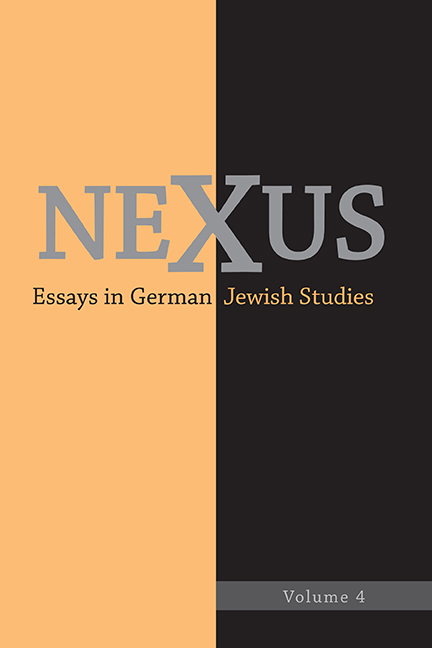Book contents
- Frontmatter
- Dedication
- Contents
- Acknowledgments
- Introduction
- Kafka, Childhood, and History
- The Black, White, and Gray Zones of Schindler's List: Steven Spielberg with Primo Levi
- Nexus Forum: A German Life: Edited and Introduced by Brad Prager
- Special Section on George Tabori: Edited and Introduced by Martin Kagel
- Introduction to the Special Section on George Tabori
- Waiting for The Cannibals: George Tabori's Post-Holocaust Play
- “Sacrifice is the test for loyalty, Goldberg.” Sacrifice and the Passion of Christ in George Tabori's Comedy The Goldberg-Variations
- “Empathy for the Entire Spectrum of Selves and Others”: George Tabori's Humanism
- A Triple Act of Translation: George Tabori and Brecht on Brecht
- My War Story: Tabori, Brecht, and Vietnam
- My Life with George
Waiting for The Cannibals: George Tabori's Post-Holocaust Play
from Special Section on George Tabori: Edited and Introduced by Martin Kagel
Published online by Cambridge University Press: 31 August 2018
- Frontmatter
- Dedication
- Contents
- Acknowledgments
- Introduction
- Kafka, Childhood, and History
- The Black, White, and Gray Zones of Schindler's List: Steven Spielberg with Primo Levi
- Nexus Forum: A German Life: Edited and Introduced by Brad Prager
- Special Section on George Tabori: Edited and Introduced by Martin Kagel
- Introduction to the Special Section on George Tabori
- Waiting for The Cannibals: George Tabori's Post-Holocaust Play
- “Sacrifice is the test for loyalty, Goldberg.” Sacrifice and the Passion of Christ in George Tabori's Comedy The Goldberg-Variations
- “Empathy for the Entire Spectrum of Selves and Others”: George Tabori's Humanism
- A Triple Act of Translation: George Tabori and Brecht on Brecht
- My War Story: Tabori, Brecht, and Vietnam
- My Life with George
Summary
Breaking with Anat Feinberg's notion of Tabori's The Cannibals (Die Kannibalen, 1968) as a kind of theatrical “Gedächtnisort” (place of memory), this essay locates the play's importance in its use of the Holocaust to speak to political and social crises in contemporary culture. While “using” the Holocaust for anything—“instrumentalizing” would be the term of disapprobation— is for many still a problematic endeavor, making the Holocaust speak to the present is precisely Tabori's achievement. This dual effort—to both deploy and transcend history—highlights the central tension within this play, as well as that inherent within a larger swath of Holocaust literature and criticism. In this sense, we can speak of Die Kannibalen and its production history (particularly at the Berliner Ensemble) as exemplary of a central problem in postwar Holocaust literature.
Introduction: Tabori, History, and the Holocaust
HOLOCAUST LITERATURE REMAINS a conundrum to some, an oxymoron to others. Can it at once give free rein to the imagination—as art presumably must do—and at the same time do historical justice to the genocide against the Jews? During the postwar period, when the Holocaust was as yet not well understood—and sometimes not even fully acknowledged—there was palpable anxiety about the role of art and its ability to represent what was to many unrepresentable. Art was frequently freighted with the responsibility of history (or historiography), at a time when there was widespread uncertainty about fixing the Holocaust within history. Like Bernhard Schlink's protagonist from Der Vorleser, the beleaguered Michael Berg, we were confronted with an impossible set of demands—above all to remember, and commemorate, what we can never really know or understand. It is not difficult to grasp, then, why no piece of Holocaust literature has ever been deemed wholly successful. George Tabori's The Cannibals (1968) is symptomatic of this dilemma.
The play attempts two apparently contradictory goals: the first, as many appreciative critics observe, is to “correct” or redirect a Holocaust discourse that was itself still in its infancy. By presenting a strikingly dissonant depiction of Jewish concentration-camp inmates—and thereby proudly breaking a taboo on the portrayal of victims—Tabori entered the field of Holocaust history, whether he intended to or not.
- Type
- Chapter
- Information
- Nexus 4Essays in German Jewish Studies, pp. 103 - 136Publisher: Boydell & BrewerPrint publication year: 2018

